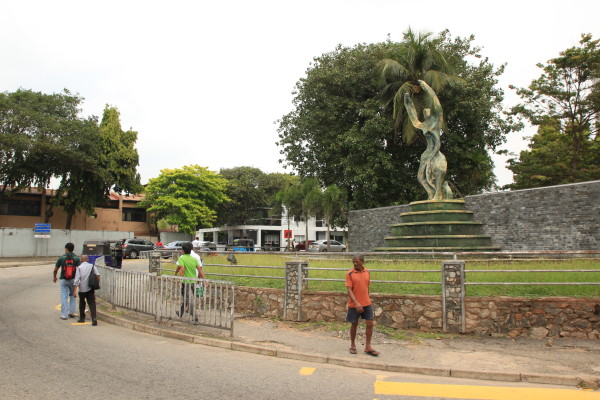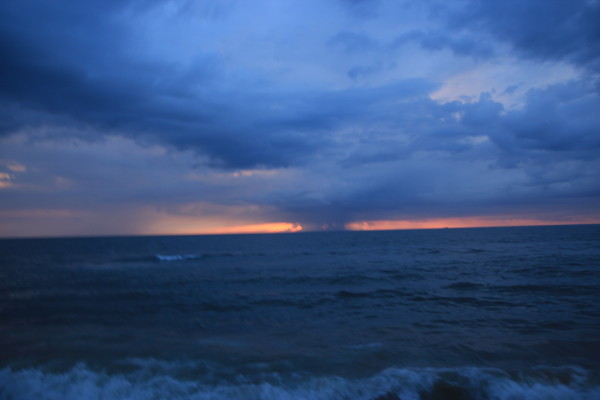[In 2009, the decades-long civil war in Sri Lanka between the terrorist LTTE or Tamil Tigers and Sri Lankan Government finally ended, but left behind a legacy of war that endures, further complicated by global climate change. In 2012, Johnny C traveled there to cover the forces of war, globalization, and climate change. Some names and organizations have been changed to protect the identities of those who participated in the events of this series.]
The time I finally had to enjoy back in Colombo (the capital city) was a reminder of how thankless a job I do is and why having the patience for humanity and stomach to handle the unfamiliar cuisines from frequent traveling is absolutely necessary. After weeks of helping women, children, displaced people, and more, you would think that it’s time to call it a day and head over to the pub. Unfortunately, the realities of the poverty line in the age of rampant globalization and being a foreigner didn’t make things any more relaxing.
Walking over to find my bank and withdraw some money, a tricycle taxi started following me around and insisting on showing me around. “Hello my friend! I Kamal! I good person! I Sri Lankan army! I help you!” And of course, my scammer sense began tingling, for this was the typical technique, but for the sake of documenting everything rather than inferring from previous experiences, I decided to ride this one out literally as the man flashed his obviously photocopied and cheaply-laminated ID indicating that he was in the army and could be trusted to show me around while everyone else was a crook in Colombo. He then shoved me into the tricycle side car after following me for several blocks because I took the time to look at his ID, and proceeded to take me everywhere but where I wanted to go: back to my hotel.
A lot of “Oh, you go see this store and buy souvenirs!” which was the same tourist scam I had seen time and again everywhere, where some driver takes some unsuspecting outsider to a place where he claims will be a good discount to get great things, and everything there is at least five times the amount you could pay normally. In trying to walk away, he then pulls me in and drives me to the middle of the city and insists I give him four thousand rupees, claiming that the meter says four thousand, which actually read four hundred. Having no change, I handed him one thousand and contemplated spitting on it, but decided I’d just get his picture and his license plate number before handing it to the police. Cheating tourists is a serious offense, but I wasn’t a tourist, I was an angry expat with experience, and about six years of street brawling techniques.
Walking back to my hotel in the rain, I ran into an old Australian friend and related the story to her about being ripped-off. We joked around about how people are the same everywhere in the world, and that I was writing this up for the Americans, so she said to quote her as saying “The only ‘white privilege’ I’ve ever had was the privilege of being constantly harassed and ripped-off by everyone who sees me.” Times are tough everywhere in the world, and Sri Lanka being no exception, people of course resort to scams to get ahead when things seem hopeless. “Scam the foreigner, because a foreigner definitely must have money to be there when they could be anywhere else” is the mindset of the charlatan. Having the patience for this is important, because in aid work, you’re not picking and choosing who to help, you’re focused on helping communities and society, which includes people who have resorted to dishonesty to survive, but instead of treating the symptoms, you hit the cause, which begins with awareness of the issue and forces at play. Take away tricycle cab thief’s problem, which is lack of opportunities and offer alternatives to improve their lives, and that theoretically resolves a few challenges preventing countries from finding their place in the sun.
Of course, when you’ve got a mixture of many tourists in a heavy tourist economy and a lot of aid workers and corporations coming in, the reaction to the presence of many foreign faces (mostly tourists) is to stick their hands out asking for more help or stick their hands into their pockets and take a few banknotes out, since few people have the patience and foresight, especially when poor families have more children than others in Sri Lanka. As with most places throughout Asia, the big fallacy of having more kids is that they are extra hands to work in labor (child labor!) and the retirement investment, without realizing that they are also an extra mouth to feed. Oops. And when you look at all the people who died in both the civil war and the tsunami, you realize there are plenty of orphans and single parents with a few children to raise on their own. So it’s not the best scenario for most people, and when it comes down to seeing a foreign face and scamming them to feed their children, most people live in a constant “do whatever we must to live” state of mind, believing that morals and law come after their stomachs are fed and their houses (if any) are secure from the elements and other criminals.
I reminded myself of this and packed up my equipment, then headed to the airport for the next plane back to Bangkok, where I would wait to see my next destination would be. I was a thousand rupees poorer, but I was on a plane off to another life, a better future, and had done my job no matter how thankless it was to the few who saw me as nothing more than a walking ATM.
End of Series
- Previous: Strange Serendipities in Ceylon (Part 1)
- Previous: Strange Serendipities in Ceylon (Part 2)
- Previous: Strange Serendipities in Ceylon (Part 3)










